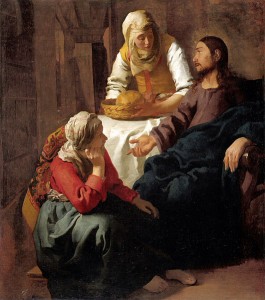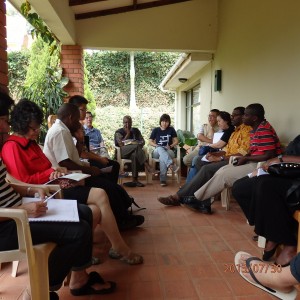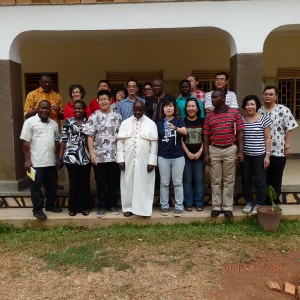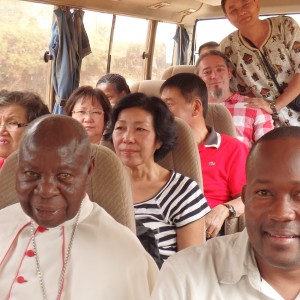As Jesus and his disciples were on their way, he came to a village where a woman named Martha welcomed him into her home. [Luke 10:38]
[L] Christ in the House of Martha and Mary, by Johannes Vermeer, 1655. [M] At the debrief on the eve of our departure. [R] Bethany House, Entebbe.
From July 21 through August 1, 2013 we were privileged to make a second trip to Africa on “a pilgrimage of pain and hope”, led by Fr Emmanuel Katongole, a Ugandan priest who is a theology professor at the University of Notre Dame, Indiana, USA.
Our reflections on the first trip are spread over five articles and are posted on this same website, beginning on 16 September 2010 with post No. 16 titled “A Pilgrimage with a Difference!”
This time round, our main objective was Rwanda where we hoped to learn from the massive deposit of wisdom the people have accumulated since the genocide started in 1994. But there were a few things we needed to do in Uganda and a few places to visit including the Saint Maria Goretti Girls Training Centre, a report on which will appear in the next post on November 16.
For this first post, we offer a quick glimpse of this second trip.
1. From the Physical Journey to the Interior Journey
We realized very early on in the trip that this indeed was going to be a “pain and hope” journey. At the Entebbe Airport, we were greeted by Fr Emmanuel and team and brought at once to the coach. Our “pain” began there and then when we realized that it was the same old diocesan coach we used three years ago, except that it was now three years older and having logged many more miles in the mean time. So it was easy to sense the “pain” segment of the journey real early while the “hope” part remained a promise. And then, lo and behold, even the air-conditioning system in the coach failed. The “hope” segment was getting increasingly more difficult to imagine. And yet, in no time, we encountered something which money literally could not buy. We were pleasantly surprised at how quickly we all adjusted to the situation. The human ability to adapt is such a wonderful gift. Looking back, we were amazed at how well and how readily we adjusted to what we would consider to be some material deficit, and became spiritually grateful for the comparative “excess” that we normally have.
- In an all but rudimentary way, we began to sense the depth of Thomas Merton’s wisdom: “Our real journey in life is interior”. We instinctively realized that a pilgrimage is at its best, not when we are physically uncomfortable, but when the physical journey is accompanied by a disturbing and uncomfortable journey inside. Only then will the journey ultimately lead to a delight and a consolation of the soul. We were grateful to be able to experience firsthand, that even the negativity of a little physical discomfort could contribute positively to this internal journey of the soul. Merton speaks of his inner experience as a form of “exposure”. He has given us a key to the interior journey as an “exposed consciousness.” Explaining Merton’s insight, Bro. David Steindl-Rest helps us understand that as pilgrims, we left home to expose ourselves to “the sacred presence, the judgment, the healing power, active at the holy place” to which we journey. This heightened “consciousness” of the depth dimensions of the sights and sounds of Africa was the very aim of our pilgrimage.
2. Group Dynamics a Tremendous Factor
Equally pleasant was the wonderful complement to our Malaysian group seven other pilgrims from three countries – Uganda, Great Britain and USA. We were a group of twenty pilgrims who were young and not so young, ranging from school students to university professors, from retirees to parish pastors, and from social justice practitioners to business men and women. Representing a cross section of society, our pilgrims brought a huge collection of gifts and experiences to this journey of pain and hope.
Group dynamics contributed tremendously to the great delight of this trip. It was truly wonderful to observe a spirit of openness to see, listen, share and learn. The morning briefing and evening debrief became part of our daily staple.
- Amidst the familiar and the new, we realized with deep gratitude the incredible gifts the Good Lord makes available to us through our brothers and sisters, if we but open our hearts and souls to receive them. As Bro. David Steindl-Rest defines it: “Openness and responsiveness are the real goal and essence of a pilgrimage.” In a group of such an incredibly gifted people, it was easy to see that on a pilgrimage such as this, while we traveled with a goal, which was to see, hear and touch ‘pain and hope’ in actual human lives, Bro. David has helped us see that “the goal was already present at every step of the way.”
3. The Spirit of Welcome
As part of that which has become familiar, we were blessed with the spirit of welcome which typifies the Africans in general and the Ugandans in particular.
In a special way on this trip, Fr Emmanuel shared with us his new book, a real gem, titled Stories from Bethany: On the Faces of the Church in Africa. In this book, he avoids the usual negative commentaries on Martha of Bethany as being just the busy doer in contrast to her sister Mary as the spiritual one who won the positive approval of Jesus for having chosen “the one thing necessary”. Instead, he highlights Martha’s spirit of welcome crucial for understanding the profound role her house in Bethany played in the life of Jesus.
- St Luke puts it so simply that it is easy to overlook the profound significance of Martha’s hospitality to Jesus: “A woman named Martha welcomed him into her home” [10:38]. “Bethany” in the New Testament has become synonymous with the highly significant place of welcome and rest amongst friends for Jesus, especially during the days immediately prior to his Passion. This is the gift of acceptance and hospitality so crucial to Jesus that author Frank Viola was persuaded to refer to Bethany as “God’s Favorite Place on Earth” in his new book of that title.
Our life experiences take us to further disclosures, this time with regards to Mary sitting at the feet of Jesus, for she too, contributed to this spirit of welcome to Jesus in a different manner, but in no less a significant way, in Bethany. Her conversation with Jesus, because this was uninterrupted by busy activities in the kitchen, was friendly, relaxed, casual and intimate.
- As friends in a relaxed atmosphere, Jesus could let his guard down and speak from his heart. Our experience tells us that inner feelings and guarded secrets are confided to close friends in such a welcoming and relaxed atmosphere. Unlike Jesus’ male disciples, the crowds, and the religious leaders, Mary’s posture of “sitting at the feet of Jesus” [Luke 10:39] also points to her inner disposition to listen carefully to Jesus’ words and to welcome them into her heart. Out of that attentive listening, she was able to discern ahead of all the male disciples, Jesus’ impending suffering and to anoint him with expensive perfume in preparation [John 12:1-8].
Mary and Martha, like our African hosts, remind us of the homes that have been “Bethany” to us in this journey of life for which we are truly grateful. At the same time, they call us to turn our homes into the much-needed “Bethany” for others who are in need of a friendly, intimate listening ear, and a welcoming heart.
It is no mere coincidence that the centre at Entebbe founded by Fr Emmanuel is named the Bethany House. Serving as the home base for his leadership in World Christianity and reconciliation within the Great Lakes Region, it is also open to all travelers as a hospitable and welcoming place of rest and reflection.
4. Hospitality by the Cardinal
Once again, we had the immense pleasure of being welcomed by the fatherly figure Emmanuel Cardinal Wamala. He spent time with us, listening to our stories and sharing some of his own. At the delightful lunch which he hosted for us, his hospitable table-fellowship included sharing with us his intimate wishes for his country and for each and every one of us.
[L] At the Cardinal’s residence. [R] Cardinal Wamala taking us to lunch.
Copyright © Dr. Jeffrey & Angie Goh, November 2013. All rights reserved.
You are most welcome to respond to this post. Email your comments to jeffangiegoh@gmail.com. You can also be dialogue partners in this Ephphatha Coffee-Corner Ministry by sending us questions for discussion.





